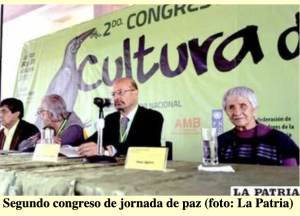
This discussion was originally launched back in 2013 during what has been called the first progressive wave”. Here is a link to the discussion as it existed at that time. The photo above comes from that time, as well as the articles listed below prior to 2015.
The re-election of Lula in Brazil in 2022 has raised hopes for a second progressive wave”.
Following the re-election of Lula as President of Brazil, we asked the CPNN representative in Brazil, Herbert Lima, if he thought that Brazil would now take a leadership role for the culture of peace. Here is his assessment:
The first and second terms of President Luiz Inácio Lula da Silva (Lula) in Brazil, from 2002 to 2010, were marked by a strong campaign to build a culture of peace in the country. Lula and his Workers’ Party (PT) defended the idea that building a more just and egalitarian society would be fundamental for building a culture of peace.
During his term, Lula implemented policies aimed at reducing poverty and social inequality, such as the Bolsa Família program and raising the minimum wage. These measures had a significant impact on improving the living conditions of millions of Brazilians, contributing to the construction of a fairer and more balanced society.
In addition, Lula also stood out on the international level, seeking to build relations of cooperation and dialogue with countries in Latin America and the world. This posture contributed to the reduction of international tensions and to the promotion of a culture of peace.
Since the end of Lula’s term in 2010, the culture of peace in Brazil has faced difficulty. The subsequent government of Bolsonaro did not prioritize policies aimed at reducing poverty and social inequality, which contributed to increased social tensions and increased violence. In addition, there was an increase in hate speech and intolerance, which threaten the construction of a fairer and more inclusive society.
There was also a change in the country’s international posture, with a distancing from relations of cooperation and dialogue with other countries in Latin America and the world, which may have contributed to the increase in international tensions.
However, it is important to highlight that building a culture of peace is a continuous and challenging process, which requires the action of different sectors of society, and does not depend only on the government. Civil society plays a fundamental role in building a culture of peace, through campaigns and actions aimed at promoting tolerance, solidarity and inclusion, and during this period it did its part, opposing the Bolsonaro government and its policies of dismantling of the institutions of the Lula government.
It is still difficult to accurately predict how the future of the culture of peace in Brazil will be in the coming years, as there is a clear division and political polarization in the current congress. However, it is possible to evaluate the proposals and speeches of the Workers’ Party (PT) and Lula to assess expectations about the culture of peace in the country. (See CPNN article of January 9.)
In general, it is expected that, if Lula has political capital in Congress, he and the PT will again prioritize policies aimed at reducing poverty and social inequality, such as the Bolsa Família program and raising the minimum wage. These measures have the potential to improve the living conditions of the most vulnerable Brazilians and, thus, contribute to building a fairer and more balanced society, fundamental to a culture of peace.
In addition, Lula and the PT are expected to seek to strengthen cooperation and dialogue relations with other countries in Latin America and the world, which may contribute to the reduction of international tensions and to the promotion of a culture of peace. (See CPNN article of January 7.)
However, it is important to remember that building a culture of peace is a complex and challenging process, and that government action is just one of the many pieces of this puzzle. Civil society also plays a fundamental role in this process, through campaigns and actions aimed at promoting tolerance, solidarity and inclusion.
ARTICLES SINCE 2022
Mexico supports the launch of the Third World March for Peace and Nonviolence
Start of the 3rd World March for Peace and Nonviolence: A global call for unity
Revista CoPaLa, Constructing Peace in Latin America, July-December 2023
Book: Culture of Human Rights for a future of Peace
Mercosur without Racism: Brazil will propose a campaign at a meeting of ministers from the bloc
Brazil President Lula’s speech to the G7
Lula Won’t Send Arms to Ukraine: “Brazil Is a Country of Peace
Brazil’s ex-president Lula pledges to bolster Latin American integration if elected
Lula: “We will rebuild relations with all the countries of the world.”
The Latin American front, after the assumption of Lula
In COP27 Speech, Lula Vows to Make Amazon Destruction ‘A Thing of the Past’
ARTICLES BEFORE 2015
Congreso de Cultura de Paz esgrime detalles de justicia y equidad (Bolivia)
Culture of Peace Congress calls for justice and equality (Bolivia)
Bachelet y Humala proyectan futuro de paz (Chile y Perú)